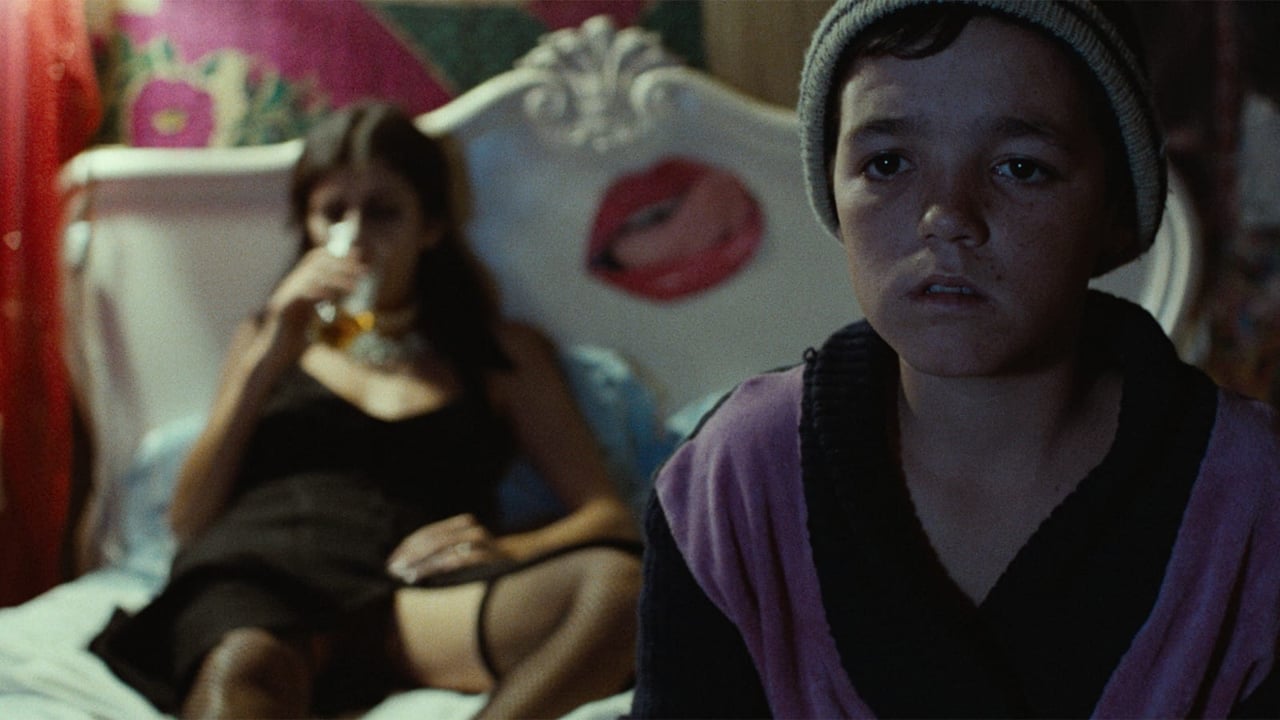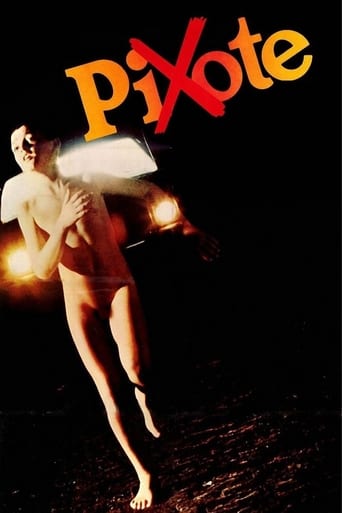

Yawn. Poorly Filmed Snooze Fest.
... View MoreLack of good storyline.
... View MoreGood start, but then it gets ruined
... View MoreOne of those movie experiences that is so good it makes you realize you've been grading everything else on a curve.
... View MoreThe life of a boy in the streets of Sao Paulo, involved with little crimes, prostitution, and other things under the wing of corrupt police and other criminals.The film features Fernando Ramos da Silva (who was killed at the age of 19 by Brazilian police in São Paulo) as Pixote. The movie is shot in the manner of a documentary and shows the strong influence by Italian neorealism in that amateur actors were used whose real lives strongly resembled those of the protagonists in the film.This is by far the most "raw" a film about juvenile crime has ever been. Because of the use of minors and the nudity / violence, this sort of film could probably not be made in the United States or much of Europe. But it never feels exploitative. Rather, it feels honest and true. And that is why it becomes a must-see.
... View MoreI'm surprised that no has ever posted a negative review for this movie, I'm also shocked by the unanimous praise on this site, so I decided to do one myself, even though a film that has reached such a magnitude of acclaim cannot take a bad opinion very lightly. I know, I know, I'm probably gonna get bashed for hating this movie, since there might be someone who will call me a stone-hearted American who doesn't care about Brazil's youth, but I do care about Brazil and its youth. By the way, I hate political correctness. It seems like if you hate certain movies, particularly because of their subject matter, you will be viewed as someone who has a bad taste in movies or just shallow and thick. I for one think it's contradictory for someone to say that they didn't like it yet call it a good movie. I call that a bunch of bull. For me, if I hate the movie, then it's a bad movie, common sense logic. It doesn't matter if it has the so- called "good script, good cinematography, good acting" and so on. Pixote is a stupid/bad/overrated, oh, that's right, I'm not allowed to criticize because that would make me an evil monster. In a nutshell, a little boy, about 9 to 12 years old, gets put into an orphanage and meets two boys older than him, about 16 to 20, and engage in harsh crimes, involving drugs, violence, rape and all the terrible stuff. I find it sick that someone praises such filth calling it beautiful when I call it sick rubbish. It's exploitation of youth, pure and simple, although certainly not intended to be since it's only trying to show an unfortunate reality happening, but it subconsciously promotes bad behavior. It kind of reminds me of the those 70s and early 80s exploitica films like "The Cannibal Holocaust", which is supposedly real. There's a reason why I'm giving this movie a negative review, because I don't like, and think there should be more room for criticism as opposed to praise. Don't watch it! See something more enjoyable. Throw those bad movies away. And another thing... Does it make it inherently wrong for me to hate "Pixote"? Am I really a mean- spirited person because I am giving this movie a very bad review? Am I the only one who doesn't like this movie? Should I shy away from expressing my emotions/thoughts toward this movie? I really don't mean to be cruel towards the street kids who suffered in real life, I just don't think that making a supposedly "documentary" film is a good idea. Besides, it's NOT a documentary, only partially, it's relatively more fiction/narrative since it follows principles similar to that of Hollywood in America. I don't mean any disrespect to the "actor" who portrayed the lead character in this film. I feel bad that he was killed by the police when he was as young as 19. Interestingly, it's been said that majority of the "actors" were not actually actors, sounds kind of paradoxical, I know, but it was meant to add more "realism". But I don't take too kindly to that kind of film-making, it doesn't seem to work, at least to me. If they are going to make this movie, it shouldn't be fiction/narrative, or in "Pixote"'s case being semi-fiction, it should be truly non-fiction/documentary. Meaning that there should be elements, such as interviews with the street kids, the police, and other people in Brazil, have the director narrate . This is ONLY MY OPINION, nothing more. And if you disagree, then just ignore it, it's not gonna stop me from having the dissenting opinion. I apologize for making people get so damn angry at me. But PLEASE don't hate me too much! I'm just giving an opinion about a FREAKING movie for God's sake!
... View MoreFollowing the robbery homicide of a Brazilian judge by a street gang, the authorities make a sweep of the local street kids in the area and intern them in a young offender's institution. The film is in part a social issue film where the way the children are treated by the system is condemned and in part a story about a young lad who grows old far too soon. The social issue, although maybe broadly relevant, is hardly au courant some three decades after the film was made, however I didn't feel like this detracted much from the film due to the excellent characterisations and strong story line. It's also not limited by the generics of the prison movie as a lot of the action takes place outside the prison walls.The main character, an extremely small boy, Pixote (pronounced Pichote), is especially winsome and actually played by a real life delinquent who was subsequently shot by police in a shoot-out. He has developed a firmness of independent judgement and level of character that you generally only find in people well into adulthood, something that he's had to do to survive. It's painfully clear at some points though that he is just a skinny little boy that needs his mother.There is charisma to spare in the acting performances, including a youngster who does an extremely catchy homage to Roberto Carlos (the great Brazilian singer as opposed to football player) for the prison gig, and appears destined for stardom if he can stay alive.The kids are in peril because the police are beating them to death in order to find out who killed the judge, whilst the incompetent prison authorities turn a blind eye and fall into a state of apathy concerning the well-being of their wards (see no evil, hear no evil, speak no evil).Babenco appears fascinated by prison culture and in both this film and his return to the genre with Carandiru (2003) he uses nakedness to remind us of the fundamental vulnerability of the human captives in his film. In the poster for Carandiru you can see the survivors of a prison riot lying naked in a yard, stripped of their clothes (in which they could conceal weapons), in Pixote a "hole" packed with naked children. Beaten, unclothed and helpless it's quite easy to connect with the camouflage of swagger and defiance that they need to survive is taken away. Fundamentally a human is a fragile creature that hurts and most of their persona is just a coping strategy.There's a dream-like feel to a lot of the film, which is often brazenly erotic (the transvestite Lilica dancing in front of a crowd whilst having her under carriage rubbed by an onlooker's raised foot), and anarchical. It's not easy to label the film as nightmarish because some of the experiences, even when negative, are extremely rich, and the friendships heartfelt.A classic faux pas of many non-Anglo movies is that whenever whites appear, they are cardboard cutouts, but here the old American john is as well-realised and succinctly characterised as he could be.Favourite scenes of mine include the post-glue-sniffing fascination of Pixote, and the half-lit dormitory riot which is truly mad.
... View MoreIs it enough that a film seem "real?"That's the pitch here, and in so many films. This one even starts with the filmmaker speaking to us before the film proper, telling us about the horrible situation and literally showing us the lead child actor in his "regular" life of squalor. We know also from the publicity that the other children are "real," though presumably all of the adults are actors. This film is set up to impress on this score. The situations are brutal and fully believable. The kids are effective. The scenes seem genuine.But its just bad film, bad drama, bad storytelling except for two bits unless you count the value of realism. That's because it has no narrative structure. Yes, we see the child harden, and why, but is that enough? Not for me. It takes more than the real to make a story, I think.I will recommend two scenes to you. They both feature Marília Pêra, who we saw as effective in "Central Station." She plays a prostitute who enlists the children to mug her johns. One scene has her after a successful heist in the woods with the children, seducing the oldest, who we know is in a relationship with one of the boys. This scene works amazingly well, lighted by the headlights of the stolen car, animated by her dancing body. The words tell us that she was a sexy go-go dancer who was fired, but the motions tell us that and so much more. Later, when they get back to her place and we see the two making love with the other children watching on the bed, she captures another mark. Wheels turn and tragedy strikes, setting up the penultimate scene which may be one of the most memorable in cinema.People are dead, and the whore and child are left on the bed. Her legs are askew displaying her crotch to us and the child. They are reaching to each other, he simply staring and she filling the room with loneliness. The camera focus changes from his blank face to her vagina, which we have seen her use seductively before in fact in every case. She approaches the boy.He in turn is drawn to her breast which he cuddles to and suckles which she accepts. But over a few moments you can see her confusion breaking her. A life of sexual twisting is visited on that contact and she breaks. The camera decides to show the boy, now lost in the last scene that follows. But it is the woman whose loss we know.These two scenes demonstrate how much greater reality a talented actress can give us, more surely than the real thing.See it for those two scenes.Ted's Evaluation -- 2 of 3: Has some interesting elements.
... View More